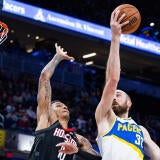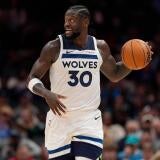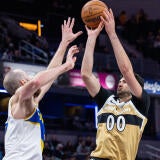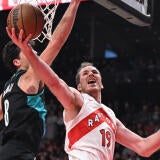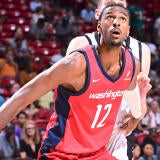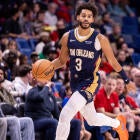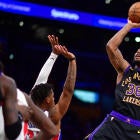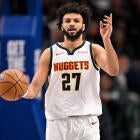Fantasy Basketball draft prep: Rookies Fantasy managers will want to target in their next draft
Find out why Alex Sarr could provide adequate scoring as a rookie
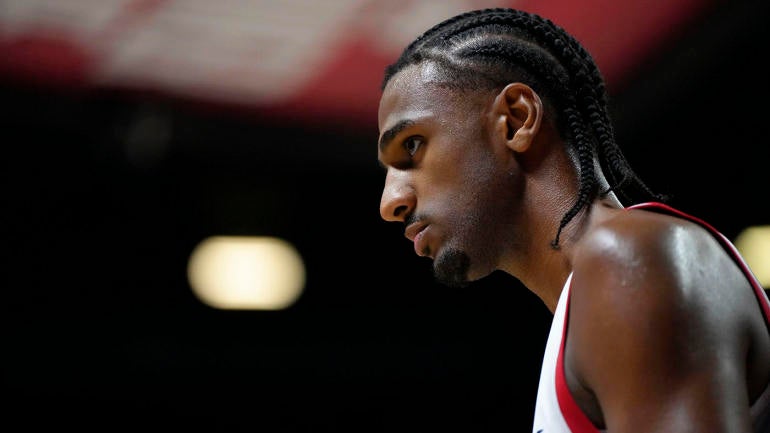
With the Olympic Games in the rear-view, basketball may be out of the national spotlight, but we're only two short months away from the start of the NBA regular season. While you may be more concerned about your Fantasy football drafts this time of year, it's never too early to start preparing for the 2024-25 Fantasy basketball season.
Each year, a major component of that preparation is evaluating the incoming rookie class. Heading into the 2023-24 season, it was all about Victor Wembanyama. How high would he go? Third round? Second round? Would someone in your league dare grab him in the first? Wherever you drafted Wembanyama last season, it certainly paid off, as the 7-foot-5 Frenchman proved in short order that he was, in fact, the real deal.
Coupled with the return of Chet Holmgren, as well as a host of intriguing lottery prospects, the 2023 rookie class produced six players with a composite ADP inside the top 125 – led, of course, by Wembanyama.
Fast-forward to 2024, and the rookie landscape is… not quite the same. Not only does the draft class lack anything close to a "generational talent", but it may be one of the least talented and least intriguing – on paper, at least – of the last 20 years. In some ways, it's reminiscent of the 2016 Draft – that was the year Malcolm Brogdon went on to win Rookie of the Year – though even that class was thought to have better talent at the top in Ben Simmons, Brandon Ingram, and Jaylen Brown.
Perhaps the 2013 Draft – the fabled Anthony Bennett Draft – is the more apt comparison. Much like the 2024 Draft, we had no idea who would go No. 1 overall until Adam Silver announced Bennett's name. And after that? A complete crapshoot of a lottery that saw Otto Porter and Alex Len go in the top 5, while Trey Burke, Michael-Carter Williams, and Shabazz Muhammad were all top-14 picks. As of now, the top players in the 2013 class, per Basketball-Reference's VORP metric, went 15th (Giannis Antetokounmpo), 27th (Rudy Gobert), 10th (CJ McCollum), 22nd (Mason Plumlee), and 13th (Kelly Olynyk).
All of this is to say the 2024 draft class will be met with a healthy degree of skepticism come Fantasy draft season. There are plenty of interesting names and landing spots, but chances are most Fantasy managers won't consider drafting a single rookie until around or after pick 100.
With that said, history dictates that at least a handful of rookies will be Fantasy-relevant in most leagues, so let's dig in on which prospects you should be monitoring over the next two months.
TOP-100 UPSIDE
While I may be lower than consensus on Sarr, I will acknowledge that he landed in a decent spot with the Wizards and should have a clear path to significant minutes at power forward. With that said, even the Wizards have some veteran talent, so Sarr – like virtually every rookie in the class – won't be walking into a tailor-made, "you're the guy" situation. Kyle Kuzma and Jordan Poole will command their touches, and for the time being at least, Malcolm Brogdon is the Wizards' starting point guard. Washington also brought in Jonas Valanciunas this summer, adding to a frontcourt where Marvin Bagley and Richaun Holmes saw meaningful minutes last season.
As a prospect, Sarr is considerably more raw than the typical No. 2 overall pick and carries plenty of unknowns. He spent last season overseas and was an abject disaster for most of Summer League in Las Vegas. I don't want to hold the latter against him too much, but it certainly wasn't an encouraging sign. Bottom-line, though, Sarr will be force-fed minutes in Washington and should provide adequate scoring, rebounding, and low-end shot-blocking. He may end up being more valuable in points leagues.
Sheppard is one of my favorite prospects in the draft, and while he'll undoubtedly find a role for the Rockets in Year 1, he's one of several young players Houston will attempt to develop simultaneously. With Fred VanVleet solidified at point guard and Jalen Green at the two, it's difficult to envision Sheppard finding his way into a consistent starting spot. Houston also has a bevy of wings – Dillon Brooks, Amen Thompson, Cam Whitmore, Tari Eason – who will all command touches, while Jabari Smith and Alperen Sengun are among the NBA's most intriguing young players.
Even in relatively limited action, Sheppard can still be Fantasy-viable. He profiles as a hyper-efficient shooter who knocked down 52.1 percent of his 3s at Kentucky last season while chipping in 4.1 rebounds, 4.5 assists, and 2.5 steals per game. Sheppard's workload is the biggest question mark, but if he can settle into a 22-to-25-minute role off the bench, he should be a solid source of 3s, steals, and assists right away.
And of course, if VanVleet or Green were to get injured – or if the Rockets make a move to consolidate some of their young talent – Sheppard would be in position to take off.
Donovan Clingan, Trail Blazers
While Clingan faces similar workload question marks to Sheppard, his shot-blocking potential alone keeps him in this group. Clingan will almost certainly open the season as the backup to Deandre Ayton – reminder: the Blazers do still have Robert Williams, as well – but if he can work his way into a consistent role, he may not need a ton of minutes to make a Fantasy impact as a blocks/rebounds specialist.
In four Summer League games, Clingan averaged nine points, 12.3 rebounds, 2 assists, and 4.3 blocks in 25.4 minutes per game. Those numbers won't be sustainable against NBA competition, but managers in need of cheap blocks, in particular, will want to keep a close eye on Clingan.
The reigning two-time National Player of the Year, Edey presents a similar stat profile to Clingan, but he should have a better opportunity in Memphis, where he'll have a good chance to open the season as the starting center. That may not equate to huge minutes right away, but Edey should see enough run to provide high-volume rebounding, adequate shot-blocking, and a strong field-goal percentage. Edey likely won't provide much else, but by the end of his time at Purdue, he was a two APG player who shot 72 percent at the free-throw line over his junior and senior seasons.
TOP-150 UPSIDE
Buzelis is yet another lottery pick who may not have a clear path to a starting spot, but it's entirely possible the Bulls look to re-tool their roster at some point, which could involve dealing one – or both – of Zach LaVine and Nikola Vucevic. But as the depth chart currently stands, Buzelis will be in position to see regular minutes off the bench at both wing spots behind LaVine and Patrick Williams.
Buzelis put up 14.4 points, 6.9 rebounds, two assists and 2.1 blocks per game for the G League Ignite last season, but efficiency will be a major concern early on. He shot just 27.3 percent from 3 in the G League and hit just 28-of-83 field goal attempts in Summer League.
With Chris Paul, Tre Jones and Devin Vassell in the mix, Castle may not start right away, but his size and versatility should lead to plenty of minutes at both guard spots in Year 1. Castle may profile as a better in real life than in Fantasy player, but his well-rounded stat profile – highlighted by high steals upside – will keep him firmly on the Fantasy radar. Whether or not Castle can improve as a shooter (26.7% 3PT last season) will determine his rookie-year upside.
Suffice it to say that Risacher is not your typical No. 1 overall pick. Or at least he doesn't fit the mold of the vast majority of the top picks over the last 20 years. In recent seasons, Wembanyama, Paolo Banchero, and Cade Cunningham each carried lofty expectations into their rookie seasons and were comfortably taken in the top 75 picks. That will not be the case for Risacher, who enters the league with the least fanfare of any No. 1 pick since Bennett.
There's reason to believe Risacher will have a significantly better NBA career, but he's far from a ready-made star. Landing in Atlanta – which moved up nine spots in the lottery – also means he joins a fairly talented roster led by Trae Young, Jalen Johnson, Bogdan Bogdanovic, Clint Capela and De'Andre Hunter. Risacher will have a chance to compete for a starting spot on the wing, but even if he beats out Hunter, he'll likely be the Hawks' No. 4 option.
Expect the 19-year-old, who shot nearly 39 percent from 3 in Europe last season, to show plenty of flashes, but he's unlikely to be a game-changing Fantasy option in Year 1.
Carlton "Bub" Carrington, Wizards
Washington made Carrington the final pick in the lottery after an impressive freshman season at Pittsburgh. Carrington was one of the standouts at Summer League, putting up 15.8 points, 2.8 3s, 7.4 rebounds, 5.2 assists, and one steal through five appearances. Carrington is a do-it-all type who rebounds well for his size, and he should have ample opportunity for a Wizards team likely to find itself in the Cooper Flagg sweepstakes this season.
For now, the presence of Brogdon is the biggest question mark. If the Wizards start and play Brogdon big minutes, Carrington's Fantasy potential may be capped. But if Washington opts to move Brogdon at some point, Carrington would be the primary beneficiary. It's also worth noting that Brogdon, who entered last season in a similar situation with the Blazers, has played just 39, 67, 36, 56 and 54 games over the last five seasons, respectively.
Coming off of a breakout sophomore season at Indiana, Ware landed in an excellent spot with the Heat, who should be able to quell any concerns about his motor and work ethic. Of course, Miami has an entrenched starter at center in Bam Adebayo, but there's not a ton of meaningful depth behind him, so Ware could open the season as the backup. While his minutes may be limited, Ware's rebounding and shot-blocking potential alone could keep him relevant in Fantasy leagues.
The 21st overall pick out of Baylor is considered somewhat of a developmental prospect, but we have to include him on this list until the Pelicans add another body at center. As of now, Missi is positioned to battle with Daniel Theis for the starting job. Whether Missi is ready for it or not, opportunity is king in Fantasy basketball, and if he's seeing 20-to-25 minutes per night, he should be able to provide blocks, rebounds, and a high field goal percentage.
DEEP LEAGUE TARGETS
Jared McCain, 76ers: McCain won't start for the title-chasing Sixers, but he has a path to earning consistent minutes off the bench. Early on, he'll likely be targeted as a 3s specialist.
Cody Williams, Jazz: The younger brother of OKC's Jalen Williams, Cody landed in a good spot with the Jazz, who have minutes to burn on young wing players. Williams likely won't be worth rostering in standard leagues, but in deeper formats, he's worth keeping an eye on.
Ron Holland, Pistons: One of the biggest mysteries in the draft, Holland was once considered a contender for the No. 1 pick before an underwhelming 2023-24 season in the G League. Holland showed some encouraging flashes in Summer League, but efficiency will be a major concern. For now, he's more of a target in deeper, points formats.
Rob Dillingham, Timberwolves: Minnesota traded into the lottery to snag Dillingham, who may be the most electrifying offensive player in the class. Long-term, landing with the Wolves should benefit his development, but it's fair to wonder if Dillingham will see enough minutes in Year 1 to warrant attention in most Fantasy leagues.
Devin Carter, Kings: On draft night, I loved the fit for Carter in Sacramento, but the Kings have since brought back Malik Monk and Kevin Huerter while adding DeMar DeRozan. On top of that, Carter underwent shoulder surgery in July and will likely miss the first half of the season.
Dalton Knecht, Lakers: Knecht falling to the Lakers at 17 was a gift, and he should vie for meaningful bench minutes right away. The Tennessee product will be a target for deeper-league managers in search of 3s.
Terrence Shannon, Timberwolves: One of the best players in college basketball last season, the 24-year-old Shannon should be ready to contribute right away. The question is whether he'll be able to earn enough minutes for a deep and talented Wolves team.
It's entirely possible that Dunn is not a rotation player in Year 1, but his elite defensive production last season at Virginia – 2.3 BPG, 1.3 SPG – warrants at least a cursory look in deep leagues.

